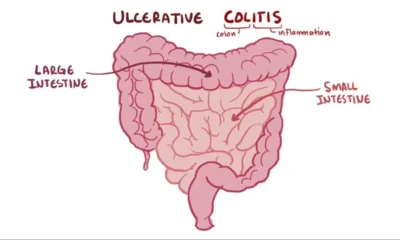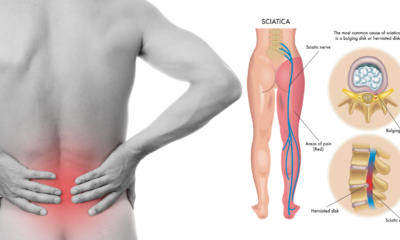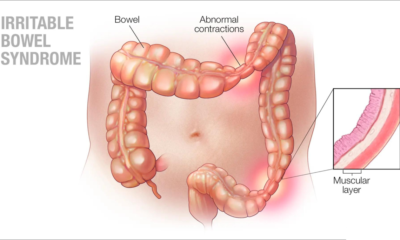Tech
Healing IBS Isn’t About Forcing Your Gut—It’s About Resetting Its Natural Rhythm
Instead of suppressing symptoms, managing IBS starts by restoring your gut’s natural rhythm. Discover how circadian health, microbiome balance, and daily habits play a vital role in IBS recovery.

When you’re living with Irritable Bowel Syndrome (IBS), it’s tempting to reach for quick fixes: laxatives, antispasmodics, extreme elimination diets. But what if your gut doesn’t need to be forced—it just needs to remember how to flow?
Many chronic IBS cases aren’t the result of a permanently damaged gut. Instead, they stem from a disrupted digestive rhythm—the body’s loss of balance in doing what it was designed to do: digest, absorb, eliminate—calmly and consistently.

Your Gut Has a Clock. Yes, Really.
Just like your sleep-wake cycle, your gut also follows a circadian rhythm. This internal clock coordinates when:
- Digestive enzymes are released
- Your gut moves food through your system (motility)
- Certain microbes are more active or dormant
- You feel hunger or fullness
When this rhythm gets disrupted—by stress, antibiotics, irregular eating, or poor sleep—your gut loses its timing. The result? Constipation, diarrhea, bloating, and pain that feel unpredictable.
“Fixing” IBS Is Often Just Rebuilding Rhythm
Instead of pushing your gut harder (with medications or restrictive diets), long-term relief often comes from restoring the gut’s natural rhythm.
That means:
✅ Eating at consistent times each day
✅ Sleeping and waking on a regular schedule (your gut needs sleep, too!)
✅ Light exposure in the morning to support your body clock
✅ Gentle movement, like walking after meals
✅ Feeding your gut microbes with fiber and probiotics (more on this below)
The Role of the Gut Microbiome
Your gut’s rhythm is coordinated with your microbiome—the trillions of bacteria that help regulate motility, inflammation, and even mood. If that microbial ecosystem is out of balance (called dysbiosis), your gut’s rhythm becomes chaotic.
Modern research now shows that supporting the right bacterial strains can help restore digestive flow and reduce IBS symptoms naturally. But not all probiotics work the same.
Why Spore-Based Probiotics Work Differently

Most probiotics die in stomach acid before reaching your intestines. But spore-forming probiotics, like Bacillus subtilis, are protected by a natural shell. That means they arrive alive, interact with your gut lining, and help reset your rhythm from within.
Products like GutShields Liquid Spore Probiotic use this technology to deliver gentle, long-term support—without overwhelming your system or forcing anything unnaturally.
The Gentle Way Is Often the Most Powerful
If you’ve lived with IBS for years, it’s easy to believe that control means suppression: suppressing pain, suppressing urgency, suppressing foods you love.
But true healing isn’t about suppression—it’s about restoration.
And restoration starts with honoring your gut’s timing, listening to its needs, and supporting it with tools that nudge—not shove—it back to balance.
Takeaway:
You don’t have to overpower your digestion. Let your body remember what it already knows—how to heal, when given rhythm, rest, and the right support.

Tech
Iron Deficiency and What Everyone Should Know About Testing and Treatment
Over the past 25 years, one of the most common and preventable medical oversights I’ve encountered is the failure to diagnose and properly manage iron deficiency anemia

Over the past 25 years, one of the most common and preventable medical oversights I’ve encountered is the failure to diagnose and properly manage iron deficiency anemia. This issue disproportionately affects women, especially those of childbearing age, and it’s frustratingly simple to address with the right tests and treatment plan.
Here’s what you need to know to protect yourself from iron deficiency anemia, ensure early detection, and maintain optimal iron levels for long-term health.
Why Iron Matters
Iron plays a crucial role in your body, helping produce hemoglobin, the protein in red blood cells that carries oxygen throughout your body. A lack of iron can lead to iron deficiency anemia, causing fatigue, weakness, and a range of other health problems.
Women, particularly those who menstruate, are at a higher risk of iron deficiency due to monthly blood loss. Athletes, especially young women, are also at increased risk because physical activity raises the body’s iron requirements.
The Difference Between Iron Deficiency and Anemia
Iron deficiency is a state where your body’s iron reserves are low but may not yet impact your red blood cell production. Anemia, however, occurs when iron levels drop so low that your body can no longer produce enough healthy red blood cells.
Anemia is commonly diagnosed using a Complete Blood Count (CBC) test, which measures red blood cells, hemoglobin, and hematocrit levels. While the CBC is an essential tool, it only identifies anemia after significant iron depletion has occurred.
To catch iron deficiency before it progresses to anemia, a ferritin test is critical. Ferritin measures your body’s iron storage levels and is the most reliable indicator of early iron deficiency.

How to Advocate for the Right Tests
Annual CBC Test:
Every teenage girl, premenopausal woman, and athlete should have a CBC test annually. If your doctor doesn’t offer it during a physical, request it—especially during sports physicals.
Ferritin Test:
Ferritin is not part of a standard CBC, so you must specifically ask for it. A ferritin level below 30 suggests low iron storage, even if your CBC appears normal. Aim for a ferritin level of at least 75 for optimal health.
Don’t Ignore Symptoms:
Symptoms like fatigue, weakness, and difficulty concentrating can occur even with mildly low ferritin levels. Advocate for thorough testing if you experience these symptoms.
Treating Iron Deficiency
Choosing the Right Iron Supplement:
Iron supplements are essential for treating iron deficiency but can cause digestive upset. The following options may help:
- Iron Bisglycinate: A gentle, well-absorbed form of iron that minimizes gastrointestinal side effects.
Iron Patches: These deliver iron through the skin, bypassing the digestive system and offering a great alternative for those with sensitive stomachs.
Dosage:
For most people, a daily dose of 25 mg of iron bisglycinate, taken twice a day, is effective. Follow your doctor’s recommendations for your specific needs.
Consistency Is Key:
- Restoring your iron levels takes time. On average, ferritin increases by only 3–7 points per month with consistent supplementation. Depending on your starting levels, it could take a year or more to reach optimal ferritin levels.
Monitor Your Progress:
- Recheck your ferritin levels annually to ensure your treatment is effective and to prevent future deficiencies.
Prevention Is Better Than Cure

Iron deficiency is preventable with routine testing and proactive treatment. Early detection through ferritin testing allows you to address deficiencies before they become anemia, sparing you from fatigue and other debilitating symptoms.
By advocating for annual CBC and ferritin tests and choosing the right supplementation strategy, you can maintain healthy iron levels and avoid the pitfalls of iron deficiency anemia.
Your Turn
Have you experienced iron deficiency or struggled with treatment? Share your challenges and successes in the comments below.
If you found this guide helpful, don’t forget to give it a thumbs up and subscribe for more actionable health tips to keep you feeling your best!
-

 Health8 năm ago
Health8 năm agoAll About Microscopic Colitis: Causes, Diagnosis, and Treatment
-

 Entertainment8 năm ago
Entertainment8 năm agoI Tried Medication, Diets, and Meditation — And Finally Found Peace in Acceptance
-

 Health8 năm ago
Health8 năm agoWhat Is a Gastroenterologist? When to See One, and the Problems They Can’t Help With
-

 Health8 năm ago
Health8 năm agoTop 7 Questions to Ask Your Gastroenterologist!
-

 Health8 năm ago
Health8 năm agoWhat Causes Mucus in Your Stool—and Why You Shouldn’t Ignore It
-

 Health8 năm ago
Health8 năm agoA New Cause and Treatment for Lymphedema
-

 Health8 năm ago
Health8 năm agoIBS and Sciatica Pain – Is There a Connection?
-

 Health8 năm ago
Health8 năm agoWhat to Eat During an IBS Flare-Up: A Practical Guide








